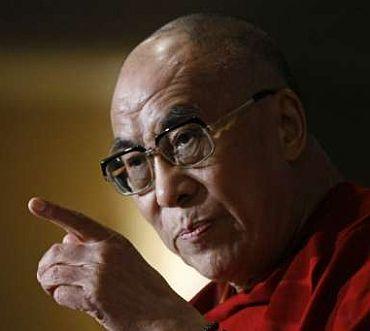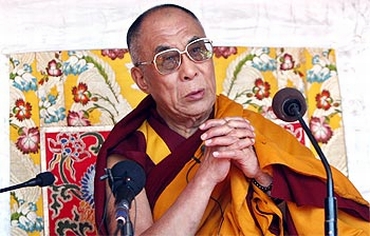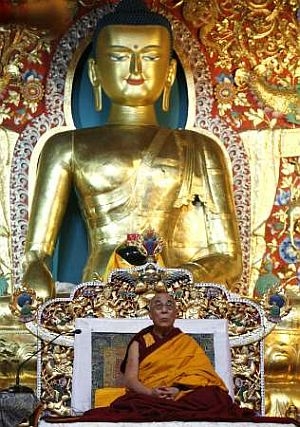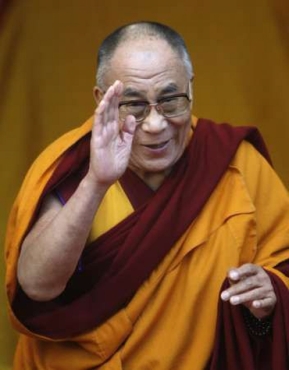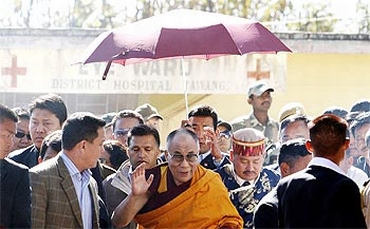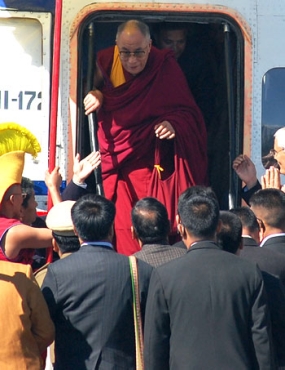 | « Back to article | Print this article |
Dalai Lama resigns as Tibet's political chief
Turning down requests by his followers to continue, Tibetan spiritual leader the Dalai Lama on Monday formally conveyed to the Tibetan Parliament-in-Exile his decision to devolve 'political authority' to pave the way for putting in place a new democratic system to pursue the cause of Tibet.
In his message in Tibetan language read out by Penpa Tsering, Speaker of the Assembly of the Tibetan Peoples Deputies on the opening day of the budget session, the Dalai Lama said, "I wish to devolve authority solely for the benefit of the Tibetan people in the long run.
"It is extremely important that we ensure the continuity of our exiled Tibetan administration and our struggle until the issue of Tibet has been successfully resolved," said the 75-year-old leader, who had fled to India in 1959 after a failed uprising against Chinese rule.
'I wish to devolve authority for the benefit of the Tibetan people'
The Dalai Lama had on Thursday announced his decision to retire as political head of Tibetan government-in-exile. He had decided to hand over his "formal authority" to a "freely-elected" leader.
He will, however, continue to be the spiritual leader of the community. The Nobel peace laureate said, "I want to acknowledge here that many of my fellow Tibetans, inside and outside Tibet, have earnestly requested me to continue to give political leadership at this critical time.
"My intention to devolve political authority derives neither from a wish to shirk responsibility nor because I am disheartened and on the contrary, I wish to devolve authority solely for the benefit of the Tibetan people in the long run."
'I will continue to serve the cause of Tibet'
However, he assured the Tibetans that he will continue to serve them as long as he was able and healthy.
"As one among the six million Tibetans, bearing in mind that the Dalai Lamas have a special historic and karmic relationship with the Tibetan people, and as long as Tibetans place their trust and faith in me, I will continue to serve the cause of Tibet," he said.
He asked the ATPD to take "all necessary steps, including appointment of separate committees, to amend the relevant Articles of the Charter and other regulations, in order that a decision can be reached and implemented during this very session."
Envisaging a situation in which his leadership was suddenly unavailable, the Dalai Lama explained to the Tibetans the need to establish a sound system of administration.
'It is necessary that we establish a sound system of governance'
"If we have to remain in exile for several more decades, a time will inevitably come when I will no longer be able to provide leadership. Therefore, it is necessary that we establish a sound system of governance while I remain able and healthy, in order that the exiled Tibetan administration can become self-reliant rather than being dependent on the Dalai Lama.
"If we are able to implement such a system from this time onwards, I will still be able to help resolve problems if called upon to do so. But, if the implementation of such a system is delayed and a day comes when my leadership is suddenly unavailable, the consequent uncertainty might present an overwhelming challenge. Therefore, it is the duty of all Tibetans to make every effort to prevent such an eventuality," he said.
'We have made great efforts to strengthen our democratic institutions'
Maintaining that one man rule was both anachronistic and undesirable, the Dalai Lama in his message said, "No system of governance can ensure stability and progress if it depends solely on one person without the support and participation" of all.
"We have made great efforts to strengthen our democratic institutions to serve the long-term interests of six million Tibetans, not out of a wish to copy others, but because democracy is the most representative system of governance," the Dalai Lama said.
"In 1990, a committee was formed to draft the Charter for Tibetans-in-Exile. In 1991, the eleventh ATPD formally adopted the Charter for Tibetans-in-Exile and assumed all legislative authority," he said.
'I have tried to raise people's political awareness'
"In 2001, the Tibetan people elected the Kalon Tripa (prime minister), directly for the first time and since then, I have been in semi-retirement, no longer involving myself in the day-to-day administration," the message said.
"The essence of a democratic system is, in short, the assumption of political responsibility by elected leaders for the popular good and for our process of democratisation to be complete, the time has come for me to devolve my formal authority to such an elected leadership," Dalai Lama asserted.
He said, "Given that the line of Dalai Lamas has provided political leadership for nearly four centuries, it might be difficult for Tibetans generally and especially those in Tibet to envisage and accept a political system that is not led by the Dalai Lama and, therefore, over the past 50 years I have tried in various ways to raise people's political awareness and encourage their participation in our democratic process".
The 14th Assembly Tibetan Peoples Deputies would discuss the message of Dalai Lama during the current budget session which would continue till March 25. As many as 137 out of 143 members of ATPD are attending the session, spokesperson of Tibetan government-in exile Thuben Sanphel said.
